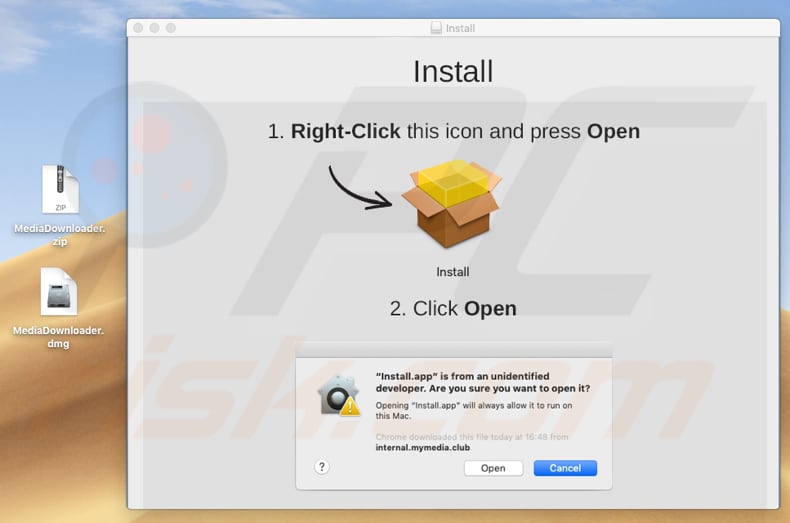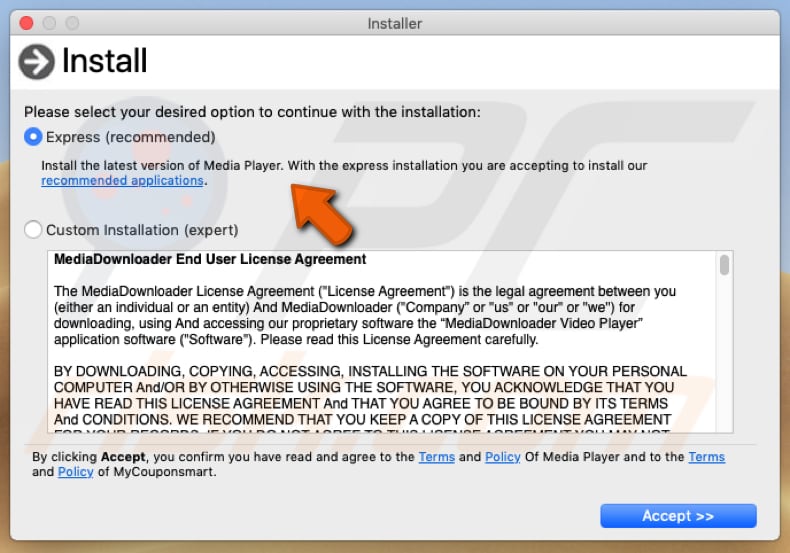How to stop browsers opening fixheavilyadvancedprogram.icu
Mac VirusAlso Known As: fixheavilyadvancedprogram.icu pop-up
Get free scan and check if your device is infected.
Remove it nowTo use full-featured product, you have to purchase a license for Combo Cleaner. Seven days free trial available. Combo Cleaner is owned and operated by RCS LT, the parent company of PCRisk.com.
What is fixheavilyadvancedprogram[.]icu?
fixheavilyadvancedprogram[.]icu is one of many deceptive websites that offer download and installation of the latest version of Adobe Flash Player.
In fact, they download the installers of various potentially unwanted applications (PUAs). Some might download malicious files designed to infect systems with high-risk malware. We strongly recommend against downloading files from fixheavilyadvancedprogram[.]icu or other similar websites offering updates to Adobe Flash Player or other legitimate software.
![fixheavilyadvancedprogram[.]icu scam](/images/stories/screenshots202001/fixheavilyadvancedprogram-icu-scam-homepage.jpg)
When opened, fixheavilyadvancedprogram[.]icu displays a pop-up window with an offer to download a new Adobe Flash Player version. At the time of research, however, it downloaded a ZIP file containing a file named "MediaDownloaderd.dmg". This is the installer of a PUA called Media Player (a.k.a MediaDownloader Video Player).
It is likely that this PUA operates as adware - software that feeds users with intrusive advertisements. Typically, apps of this type display ads (coupons, banners, surveys, pop-up ads) that conceal underlying content of most/all visited web pages. Furthermore, if clicked, they usually open various untrustworthy, potentially malicious websites.
In some cases, the ads execute scripts designed to download and/or install other PUAs. Websites such as fixheavilyadvancedprogram[.]icu are commonly designed to trick people into downloading the installers of other PUAs. For example, browser hijackers.
In most cases, browser hijackers promote fake search engines by changing certain browser settings. PUAs of this type often collect browsing-related (and other) data. For example, IP addresses, entered search queries, addresses of visited web pages, geolocations, etc.
In some cases, they record personal details. Websites that offer to update Adobe Flash Player sometimes download installers that infect systems with ransomware, Trojans, and other high-risk malware.
Therefore, having a computer infected with such malware can lead to serious problems such as identity theft, monetary, data loss, problems relating to browsing safety, online privacy, and so on. Do not download any software or files from fixheavilyadvancedprogram[.]icu or other, similar sites.
| Name | fixheavilyadvancedprogram.icu pop-up |
| Threat Type | Phishing, Scam, Mac malware, Mac virus. |
| Fake Claim | This web page claims that there is a new version of Adobe Flash Player that can be downloaded from it. |
| Detection Names | Forcepoint ThreatSeeker (Suspicious), Full List (VirusTotal). |
| Serving IP Address | 3.219.103.134 |
| Promoted Unwanted Application | Media Player (MediaDownloader Video Player). |
| Symptoms | Your Mac becomes slower than normal, you see unwanted pop-up ads, you are redirected to dubious websites. |
| Distribution methods | Deceptive pop-up ads, free software installers (bundling), fake Flash Player installers, torrent file downloads. |
| Damage | Internet browser tracking (potential privacy issues), display of unwanted ads, redirects to dubious websites, loss of private information. |
| Malware Removal (Windows) |
To eliminate possible malware infections, scan your computer with legitimate antivirus software. Our security researchers recommend using Combo Cleaner. Download Combo CleanerTo use full-featured product, you have to purchase a license for Combo Cleaner. 7 days free trial available. Combo Cleaner is owned and operated by RCS LT, the parent company of PCRisk.com. |
There are many other web pages similar to fixheavilyadvancedprogram[.]icu. Some examples include operateuberdevelopedprogram[.]icu, operatedevelopeduberprogram[.]icu and installcompletelyspeedyprogram[.]icu.
Typically, people do not visit these sites intentionally - they are redirected to them through other rogue pages, clicked deceptive ads, or PUAs already installed on the browser and/or operating system.
How did potentially unwanted applications become installed on my computer?
In most cases, this happens when people click dubious, deceptive advertisements or download and/or install various software without checking the settings (in the setup). In many cases, developers have successfully tricked people into downloading and/or installing PUAs using a deceptive marketing method called "bundling".
They distribute PUAs in this way by including unwanted apps into the set-ups of software (usually free).
They place offers to download and/or install unwanted apps into settings such as "Custom", "Advanced", and so on. When people download and/or install software without checking or changing these settings, they often download/install their software with additional PUAs included in the setup.
How to avoid installation of potentially unwanted applications
Download all software from official and trustworthy websites and avoid third party downloaders, installers, unofficial web pages, Peer-to-Peer networks (torrent clients, eMule) and other channels of this type to download/install software.
Check all download/installation settings ("Custom", "Advanced") available in the setup - these often include additional offers to download/install unwanted software (dismiss these before finishing the process). Do not click ads that are displayed on dubious web pages (e.g, adult dating, gambling, pornography).
Typically, they open untrustworthy websites or cause download/installation of unwanted, potentially malicious programs. In most cases, browsers can be prevented from displaying ads and/or causing redirects to dubious sites by removing all unwanted, suspicious extensions, plug-ins, and add-ons.
Also remove programs of this kind from operating systems. If your computer is already infected with PUAs, we recommend running a scan with Combo Cleaner Antivirus for Windows to automatically eliminate them.
Appearance of fixheavilyadvancedprogram[.]icu scam (GIF):
![Appearance of fixheavilyadvancedprogram[.]icu scam (GIF)](/images/stories/screenshots202001/fixheavilyadvancedprogram-icu-scam-appearance.gif)
Text in the main pop-up:
Software Update
Flash Player Update
Download new version
Update now
Flash Player is an essential plugin for your browser that allows you to view everything from video to games and animation on the web.
Flash Player supports several data formats AMF, SWF, XML and JSON. The multimedia formats which are supported by Flash Player include .MP3, .FLV, .JPEG, .GIF, .PNG and .RTMP.
Other supported features include accelerated graphics rendering, multi-thread video decoding and webcam support.
Later Install
Screenshot of a fake Adobe Flash Player installer and files dowloaded from fixheavilyadvancedprogram[.]icu:

Another screenshot of a fake Adobe Flash Player installer downloaded from fixheavilyadvancedprogram.icu with Media Player included within:

Instant automatic malware removal:
Manual threat removal might be a lengthy and complicated process that requires advanced IT skills. Combo Cleaner is a professional automatic malware removal tool that is recommended to get rid of malware. Download it by clicking the button below:
DOWNLOAD Combo CleanerBy downloading any software listed on this website you agree to our Privacy Policy and Terms of Use. To use full-featured product, you have to purchase a license for Combo Cleaner. 7 days free trial available. Combo Cleaner is owned and operated by RCS LT, the parent company of PCRisk.com.
Quick menu:
- What is fixheavilyadvancedprogram.icu pop-up?
- How to identify a pop-up scam?
- How do pop-up scams work?
- How to remove fake pop-ups?
- How to prevent fake pop-ups?
- What to do if you fell for a pop-up scam?
How to identify a pop-up scam?
Pop-up windows with various fake messages are a common type of lures cybercriminals use. They collect sensitive personal data, trick Internet users into calling fake tech support numbers, subscribe to useless online services, invest in shady cryptocurrency schemes, etc.
While in the majority of cases these pop-ups don't infect users' devices with malware, they can cause direct monetary loss or could result in identity theft.
Cybercriminals strive to create their rogue pop-up windows to look trustworthy, however, scams typically have the following characteristics:
- Spelling mistakes and non-professional images - Closely inspect the information displayed in a pop-up. Spelling mistakes and unprofessional images could be a sign of a scam.
- Sense of urgency - Countdown timer with a couple of minutes on it, asking you to enter your personal information or subscribe to some online service.
- Statements that you won something - If you haven't participated in a lottery, online competition, etc., and you see a pop-up window stating that you won.
- Computer or mobile device scan - A pop-up window that scans your device and informs of detected issues - is undoubtedly a scam; webpages cannot perform such actions.
- Exclusivity - Pop-up windows stating that only you are given secret access to a financial scheme that can quickly make you rich.
Example of a pop-up scam:

How do pop-up scams work?
Cybercriminals and deceptive marketers usually use various advertising networks, search engine poisoning techniques, and shady websites to generate traffic to their pop-ups. Users land on their online lures after clicking on fake download buttons, using a torrent website, or simply clicking on an Internet search engine result.
Based on users' location and device information, they are presented with a scam pop-up. Lures presented in such pop-ups range from get-rich-quick schemes to fake virus scans.
How to remove fake pop-ups?
In most cases, pop-up scams do not infect users' devices with malware. If you encountered a scam pop-up, simply closing it should be enough. In some cases scam, pop-ups may be hard to close; in such cases - close your Internet browser and restart it.
In extremely rare cases, you might need to reset your Internet browser. For this, use our instructions explaining how to reset Internet browser settings.
How to prevent fake pop-ups?
To prevent seeing pop-up scams, you should visit only reputable websites. Torrent, Crack, free online movie streaming, YouTube video download, and other websites of similar reputation commonly redirect Internet users to pop-up scams.
To minimize the risk of encountering pop-up scams, you should keep your Internet browsers up-to-date and use reputable anti-malware application. For this purpose, we recommend Combo Cleaner Antivirus for Windows.
What to do if you fell for a pop-up scam?
This depends on the type of scam that you fell for. Most commonly, pop-up scams try to trick users into sending money, giving away personal information, or giving access to one's device.
- If you sent money to scammers: You should contact your financial institution and explain that you were scammed. If informed promptly, there's a chance to get your money back.
- If you gave away your personal information: You should change your passwords and enable two-factor authentication in all online services that you use. Visit Federal Trade Commission to report identity theft and get personalized recovery steps.
- If you let scammers connect to your device: You should scan your computer with reputable anti-malware (we recommend Combo Cleaner Antivirus for Windows) - cyber criminals could have planted trojans, keyloggers, and other malware, don't use your computer until removing possible threats.
- Help other Internet users: report Internet scams to Federal Trade Commission.
Share:

Tomas Meskauskas
Expert security researcher, professional malware analyst
I am passionate about computer security and technology. I have an experience of over 10 years working in various companies related to computer technical issue solving and Internet security. I have been working as an author and editor for pcrisk.com since 2010. Follow me on Twitter and LinkedIn to stay informed about the latest online security threats.
PCrisk security portal is brought by a company RCS LT.
Joined forces of security researchers help educate computer users about the latest online security threats. More information about the company RCS LT.
Our malware removal guides are free. However, if you want to support us you can send us a donation.
DonatePCrisk security portal is brought by a company RCS LT.
Joined forces of security researchers help educate computer users about the latest online security threats. More information about the company RCS LT.
Our malware removal guides are free. However, if you want to support us you can send us a donation.
Donate
▼ Show Discussion